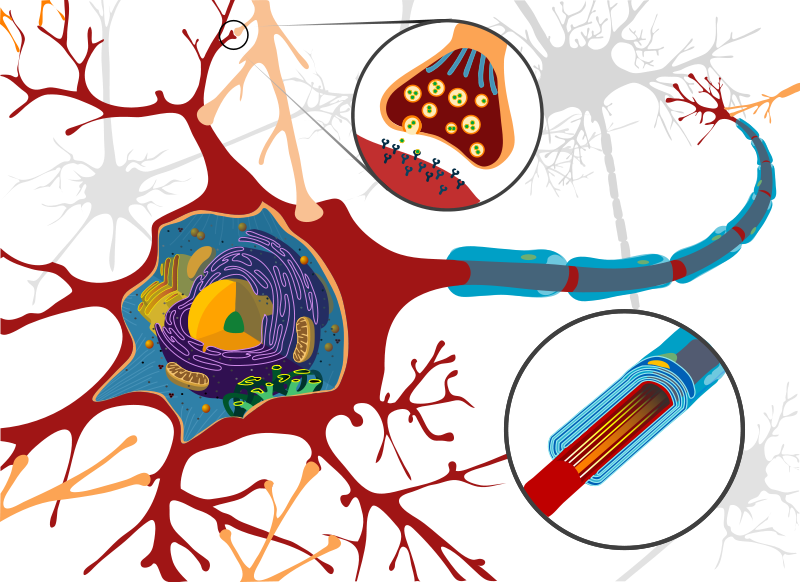Cover Photo: Neuron, taken on 12 December 2010 by LadyofHats, Harvie from Wikimedia, Volume 5, Number 2: December 2020 | Op-Ed
The free will assumption has pervaded economics, law, and politics. What do you think happens to ethics when people believe there is no free will? Would people obey the law? Would workers be productive? Would people care about redistribution? The mainstream opinion is that without it, people wouldn’t hold themselves responsible, become apathetic and depressed, eventually leading to the collapse of civilization. However, this op-ed argues that determinism can be a powerful tool in shaping an ego-less, empathetic, equitable society with the condition that people adopt a nihilistic perfectionist’s narrative of the philosophy.
Right now, the world has already decided what you will eat tomorrow. Similarly, the fact that you are reading this article has been decided since the birth of the universe. Determinism is a philosophy that explains all events as part of an unbreaking chain of causality. It is explained through the field of neurophysiology (the study of the nervous system), where brain scanners have shown that all of our thoughts, desires, dreams, and memories are determined by an intricate network of neurons. This meant that we could predict a person’s reaction to any stimulus with 100 % accuracy given a full comprehension of their brain architecture. This means there is no such thing as free will; our identities are merely consequences of our genes and predetermined environmental factors. This has scary implications for economics that must be handled carefully.
We first begin our analysis with the ego and private property. What determines ownership of things? John Locke argues that private property is created when one adds value into extracted natural resources by mixing it with labor. The British Empire used this to justify privatization of commons which was originally shared between indigenous people and the web of biodiversity. Determinists can view this in many ways. One could say the British Empire was absolved from their actions since they had no free will. Alternatively, another could argue that their justification is based on no merit of their own—natural resources belong to nature. The op-ed adopts the latter perspective, detaching ego from all manner of beings.
Afterwards, we must question the importance of ego. One could attribute ego to an important driver of productivity and creativity. Without it, everyone would be lazy and unmotivated. In contrast, this op-ed argues that ego is only one possible driver of motivation. It is born from an innate desire to gain an upper social standing. However, with the absence of free will, there is no inferiority or superiority. Without the existence of envy, cooperation is all the more likely and people can be more productive in a team environment, assuming everyone share the same interpretation of the philosophy, of course.
Empathy is a key factor in solving countless issues, and we can all empathize with lack of free will. It allows us to see drug dealers as marginalized populations affected by the drug war. It lets us feel the pain of animals like our own, so that we reduce our meat consumption, and subsequently lower the meat industry’s negative externalities. With determinism, we are more motivated to understand people’s brains and that knowledge can be utilized in designing economic models with less risk of information failure. In addition, this can promote an equitable society. As one’s wealth is viewed through the lens of luck only, there will be more demand for redistributive policies. In an ego-less society, politicians will be less motivated by greed, so egalitarian policies are more likely to be implemented.
It’s no secret that this op-ed relies on unrealistic assumptions like removing everyone’s ego, which barely any could actually achieve to begin with. That’s because you can only see things through your eyes, hear sounds through your ears, and smell things through your nose. Empathy requires stretching one’s experience to match another, which may be possible toward some people, but nearly impossible for everyone. Without these two assumptions, equitable distribution cannot be achieved. However, the message isn’t whether it can be realistically achieved or not, but rather it can be theoretically achieved to prove the point that determinism by itself is neutral. The world preordains a different ending for everyone, which can be sad or happy.
Learning about determinism itself doesn’t lead to depression; the future will always remain a mystery to us, so we can never know our inevitable destiny. Determinism is a powerful, but dangerous tool in economics. It can justify imperialism, or peace. It can inspire empathy, or apathy. It can be a start toward an equitable society or an anarchist state. The same with nihilism, it may be seen as fatalist in that nothing really matters, or a way to remove oneself from destructive worldly desires. However, although this op-ed serves to inspire and empower, it is not optimistic by any means. It calls for a perfectionistic pursuit of denying one’s human nature such as envy and greed and exploring economics in the fields of neurophysiology further.
References
Shiva, V. (2009, October 4). The Enclosure of the Commons. The Bear Market Economics Phenomenon. http://bearmarketnews.blogspot.com/2009/10/enclosure-of-commons.html
Cave, S. (2016, June 10). There’s No Such Thing as Free Will. The Atlantic. https://www.theatlantic.com/magazine/archive/2016/06/theres-no-such-thing-as-free-will/480750/











































